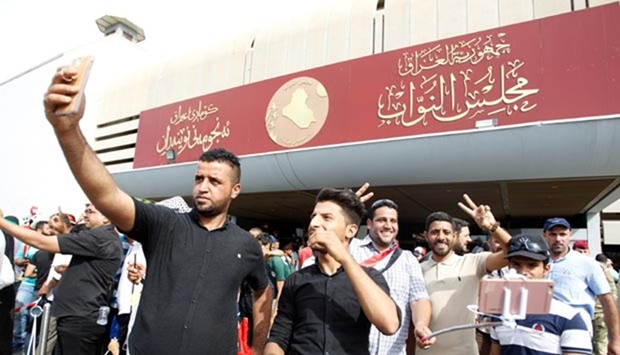Demonstrators pulled down or scaled slabs of heavy concrete blast wall to enter the fortified area where Iraq's main government institutions are located, the culmination of weeks of political turmoil and inaction by parliament.
While there is still the potential for escalation, the situation was calm on Sunday, with protesters touring the area and taking photos of places they have rarely if ever been able to access.
"This is the first time I've been here since I came with my school under Saddam (Hussein)," said 32-year-old Yusef al-Assadi, who took a "selfie" in front of the unknown soldier's monument.
"It's one of the most beautiful places to be in Baghdad. It should be for everyone, yet the people were not allowed here," he said.
Assadi said it was striking "how rich this place is. Here, there is air conditioning and electricity everywhere, but the people of Iraq suffer from power cuts all the time."
Many Iraqi politicians live in luxury, while most average citizens make do with abysmal services that include only a few hours of government-provided electricity per day at the height of summer.
Prime Minister Haider al-Abadi's office said he had ordered the pursuit of people involved in attacks or vandalism, but security forces were not taking action against protesters inside the Green Zone on Sunday.
Abadi "directed the interior minister to pursue the elements who attacked the security forces and citizens and members of parliament and vandalised state properties and to refer them to the judiciary to receive their just punishment," a statement said.
'System is not working'
Protesters attacked at least one MP as well as cars they believed belonged to lawmakers on Saturday, and broke into offices in parliament.
But others sought to contain the destruction, and many were content to take photographs of themselves in parliament, with some sitting in seats usually occupied by lawmakers.
The fact that security forces may fear the repercussions of crossing powerful Shia cleric Moqtada al-Sadr will likely hamper Abadi's directive.
Many of the demonstrators were supporters of Sadr, and members of his Saraya al-Salam militia group deployed around parliament on Saturday night.
The protesters broke into the Green Zone on Saturday afternoon after MPs again failed to approve new ministers to replace the current party-affiliated cabinet.
Both Abadi and Sadr have called for the change, but powerful political parties that rely on control of ministries for patronage and funds have opposed the move.
"Even the most sectarian of Iraqis are seeing the failure of their leaders and their system," said Patrick Skinner, a former CIA case officer who is now with The Soufan Group consultancy.
"The question might not be 'why now' as it relates to the anger, but 'why it took so long'. Their system is not working," he said.
Parliament approved some of Abadi's nominees earlier in the week, but "they were replacing figures who were easy to replace," said Kirk Sowell a Jordan-based political risk analyst who is the publisher of Inside Iraqi Politics.
"Abadi just looks more and more impotent... He is just very weak. He will not be impeached. But he is being made less relevant by the day," Sowell said.

